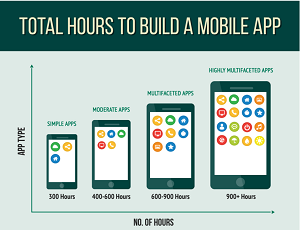Building a Mobile App? Set Aside 18 Weeks and Up to $250,000
By many accounts, the state of enterprise mobile app development is a mess. The mobile app skills shortage is a chief culprit, of course, leading to a failure to capitalize on mobile investments and forcing many companies to seek outside development help by outsourcing work to offshore coders.
Now one of those offshore dev firms is highlighting the complexity of building a mobile app, as if rubbing the problem in the faces of U.S. enterprises -- and perhaps drumming up business in the process.
Whatever the motivation, an infographic from Indian offshore development company Nine Hertz provides some insight into the complications involved in creating even a simple mobile app, which takes about 300 hours, never mind a complex, multifaceted app, which requires 900 or more hours to produce.
In fact, on average, Nine Hertz says, it takes about 18 weeks to develop and publish a typical native mobile app, with 10 weeks needed for back-end coding and eight weeks devoted to constructing the front end.
Back-end development is more time-consuming because of the myriad services that need to be wired up, such as user management, server-side logic, data integration and push notification services. Because of that complexity, the industry has seen a growing move toward Mobile-Back-End-as-a-Service (MBaaS) offerings, such as those provided by Amazon Web Services Inc. (just announced last week), Kony, AnyPresence and many others.
 [Click on image for larger view.]
Mobile App Time Sink (source: Nine Hertz)
[Click on image for larger view.]
Mobile App Time Sink (source: Nine Hertz)
Front-end development, meanwhile, would seem to be simpler, with a focus on designing, developing, testing and improving the UI. However, to provide the best UX, mobile developers need to grapple with the thorny problem of providing functionality when apps go offline. That involves data caching -- "creation of services that store the data locally to improve the speed of the app" -- and synchronization of app data. "This phase brings the data together so that it can be accessed offline," Nine Hertz said.
Offline functionality is being addressed by vendors such as Mendix and Couchbase, but remains a formidable challenge.
In addition to the data caching/offline issue, front-end development requires initial mock-ups and wire-framing before the actual coding, and testing and deployment chores afterward.
Combined, all these issues can add up to steep app development costs, depending on the features, rate per hour of development, coder expertise and so on. Nine Hertz said a simple app can require $3,000 to $8,000 to develop, while a more complex app can cost $50,000 to $150,000 -- with gaming apps running up to $250,000.
Those costs are based on per-hour service charges averaging $150 in the U.S. for iOS development and $168 for creating Android apps, Nine Hertz said. Those costs are much less in the company's home nation, India, where they average $30 and $26 per hour, respectively, which provides a clue as to the allure of offshore outsourcing.
It might also explain why enterprise app developers are enjoying a "
gold rush" as reported here recently:
"The gold rush is underway with the number of developers primarily targeting enterprises up from 16 percent to 20 percent over the last 6 months," a VisionMobile survey of more than 8,000 developers said.
The gold in this case comes down to cash, and enterprise app developers are raking in more than their consumer brethren. The report stated: "43 percent of enterprise app developers make more than $10,000 per month versus 19 percent of consumer app developers reaching the same revenue level."
Another recent survey pointed out the top complaints of mobile app developers, which enterprises might want to pay attention to in order to keep mobile devs happy and hold on to these valuable coders.
Unless they want to go offshore, of course.
What's your experience in developing mobile apps? Are these cost estimates on target? Comment here or drop me a line.
Posted by David Ramel on October 20, 2015